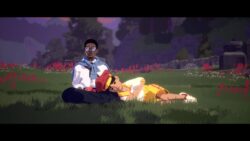Season: A Letter To The Future – not a fast-paced game (pic: Scavengers Studio)
A thoughtful new indie game explores issues of memory and growth in a captivating game world on the verge of catastrophic change.
As the heydays of fighting games, racers, and first person shooters recede in life’s rear view mirror, video games are starting to embrace subject matter that would traditionally have been viewed either as too complex or insufficiently action-packed. Titles like Journey and What Remains Of Edith Finch? were early indicators of a medium growing past its adolescence, opening the door that allows games like Season: A Letter To The Future to prosper.
There’s still interaction and a degree of player agency to these games, but instead of pumped up heroics and gunplay you get mysteries that aren’t immediately (or in some cases, ever) explained, and an examination of the human condition that wouldn’t be possible sitting behind a steering wheel or belt-feed machine gun. These sort of games have a more meditative pacing, which can feel like a welcome respite from the interesting times in which we live.
In Season: A Letter To The Future you play as a woman about to embark on a new chapter of her life, leaving the happy but insular mountain village where she grew up to go and explore the wider world. However, it’s quickly apparent that this isn’t the world we know, even if it shares many of the same props.
Your first job is to find objects in your house that inspire strong memories associated with each of the five senses. You need them to power-up a magical charm that acts as protection from the mysterious ‘dream sickness’ that afflicts everyone outside the village. The twist is that every item you add causes your mother to lose the related memory forever. It’s a poignant beginning that foreshadows its themes of memory and irrevocable change.
In a nod to good old adventure game tradition, you’re also given the equipment you’ll need on your quest: a polaroid camera, a tape recorder, and a journal to log your discoveries. As you leave your house and explore the village, you’re encouraged to photograph anything that catches your eye and record interesting sounds you stumble across.
Once you’ve collected five or more sights and sounds in a particular area, you’re prompted to add them to your notes, scrapbook style, positioning pictures, captions and recordings across its pages. It’s a process that brings a number of surprises; firstly that there’s no reward for doing it beyond the intrinsic satisfaction of seeing your observations laid out in front of you, and secondly that despite not being gamified in any way you find yourself diligently repeating the exercise for every area you chance across.
As you leave the village, you’re presented with your final inventory essential: a bike. Pedalling away from the gates, the PlayStation 5’s adaptive triggers offering just the right level of resistance to convey the sense of effort, you’re soon freewheeling downhill into a valley that is itself in a moment of radical change.
Riding past the destroyed hulks of vast industrial cranes, you soon find out that the entire area is about to be submerged in water thanks to a decaying dam. Rather than leave it to fate, authorities have decided to demolish it, flooding the valley at a nominated date and time, giving residents time to evacuate. You’ll be one of the last to see it before the deluge washes everything away.
You’ll also record it for posterity, creating your personal letter to the future, as you tease out abstruse details of the dream sickness and its potential causes and cure. Despite the looming flood, it’s an unhurried process that gives you plenty of time to wander, look and listen, before committing your findings to your journal.
Season: A Letter To The Future – on your bike (pic: Scavengers Studio)
Dialogue is sparse, with relatively few people remaining in the valley, and along with fragments of text from posters, letters, and scrawls on the backs of photographs, often has a sort of inscrutable mock-profundity. Elliptical statements and half-drawn characters never really give you enough information to make sense of what the developers are trying to convey. It adds to the air of mystery, but also feels a bit cheap.
This is also true of the lack of real exploration. While there are occasional forks in the road, and places that feel as though you could easily have cycled right past them, it’s far from an open world. Stray from the paved road or trail and you’ll soon bump up against immoveable obstacles, some of which snag you or your bike, trapping you temporarily and occasionally forcing you to close and reopen the game.
You do have freedom – namely the content and layout of your journal, and the ability to include anything you see fit – but as with most games in the pejoratively named walking simulator genre, the experience is at least partly on rails. That’s also because its main focus isn’t actually exploration, so much as the emotions and histories you uncover and document as you photograph the scenery, or simply cycle through it.
It’s just a shame it doesn’t have more to say. Like Firewatch, another game whose story failed to live up to its atmosphere and setting, it manages to create a wonderful sense of place, but then doesn’t do anything with it. Mysteries are all very well, but you can’t shake the sense that all you get here is a jumble of clues that don’t actually lead anywhere.
Season: A Letter To The Future’s languid pacing and lack of danger make it relaxing to play, and creating your scrapbook is a novel and pleasing process. The problem is you’re unlikely to be able to make much sense of its contents, the game’s plot remaining resolutely opaque despite your best efforts to record and decode it.
Season: A Letter To The Future review
In Short: A poignant, slow-paced but ultimately shallow exploration of memory and legacy in a changing world, that also manages to be the world’s first cycle-based walking simulator.
Pros: Evocative art style, elegantly drawn scenery, and pared-back text all create an impressive and consistent mood. Strangely compelling gameplay, despite the lack of immediate reward.
Cons: The experience is fundamentally on rails and there’s no skill involved. You occasionally get stuck on pieces of scenery and the story’s way too ambiguous for its own good.
Score: 6/10
Formats: PlayStation 5 (reviewed), PlayStation 4, and PC
Price: £24.99
Publisher: Scavengers Studio
Developer: Scavengers Studio
Release Date: 31st January 2023
Age Rating: 3
Email [email protected], leave a comment below, and follow us on Twitter.
MORE : Hi-Fi Rush review – the best Xbox Series X exclusive
MORE : Forspoken review – how not to launch a new video game franchise
MORE : Dead Space remake review – return of the necromorphs
Follow Metro Gaming on Twitter and email us at [email protected]
To submit Inbox letters and Reader’s Features more easily, without the need to send an email, just use our Submit Stuff page here.
For more stories like this, check our Gaming page.
A thoughtful new indie game explores issues of memory and growth in a captivating game world on the verge of catastrophic change.





